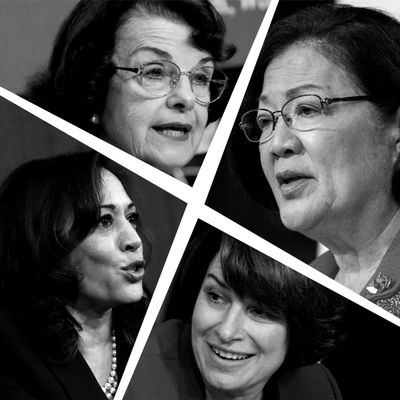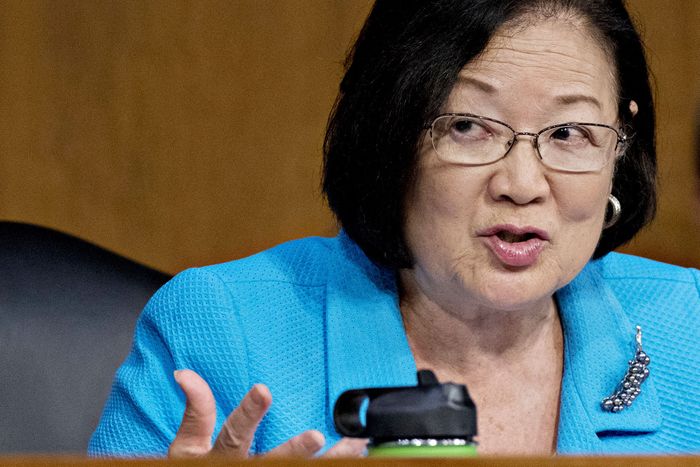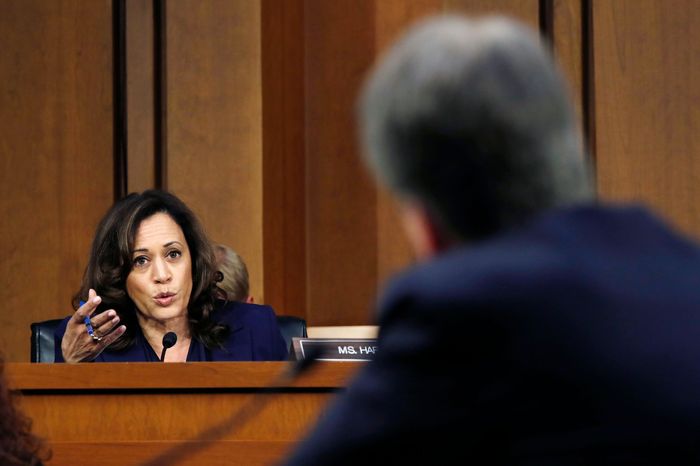
During Brett Kavanuagh’s confirmation hearings this week, the Supreme Court nominee underwent intense questioning about his judicial record, views on reproductive rights, close proximity to a man accused of sexual misconduct, and stance on assault weapons, to name a few. But the tough questions were largely raised by the women members of the Senate Judiciary Committee. Aside from Senator Cory Booker (who pressed him on affirmative action and released “committee confidential” documents) and a select few questions from other Democrats on the committee, the male members mostly lobbed softball questions at the nominee — especially about the extremely non-judicial subject of sports.
Here, a look at how women senators stepped up and held Kavanaugh accountable during the hearings.
Senator Mazie Hirono was tough, succinct, and unflinching in her questions about harassment.
Since January, Senator Mazie Hirono of Hawaii has asked every nominee, including those up for judicial positions, if they’ve ever sexually harassed or assaulted anyone. She has also asked if they have been disciplined for such behavior. The senator told the Cut prior to the Kavanaugh hearings that she planned to ask him the same — and she did not disappoint. Hirono opened by asking him those very questions, before immediately going into the topic of his former boss, Judge Alex Kozinski, who retired in December after 15 women accused him of sexual misconduct.
Hirono was unrelenting in her questioning. She asked Kavanaugh yes or no questions about his knowledge of the former judge’s behavior, and refused to let him elaborate beyond the single word answers she sought. She pressed him as to whether he was on a notoriously inappropriate email chain with Kozinski. She also asked him whether 3-D guns were protected under the constitution, if he knew about domestic-abuse allegations against former White House staff secretary Rob Porter before recommending him for the job, and pushed him on his stance on the Constitutional rights of Native Hawaiians. At no point in her questioning did Hirono allow Kavanaugh to talk in circles around her.
Senator Kamala Harris’s question about laws governing women’s bodies left Kavanaugh speechless.
California senator Kamala Harris also put Kavanaugh through the sort of firm and difficult questioning you’d expect a judicial candidate to endure (rather than easy inquiries about coaching his daughter’s basketball team like the Republican members of the committee kept asking). When her time came on Wednesday night, the questions Harris asked left Kavanaugh visibly flustered. At one point, she brought up the subject of abortion and women’s reproductive rights. Harris asked Kavanaugh whether he was aware of any laws “that the government has power to make over the male body?” The nominee was stunned into silence.
Kavanaugh fumbled and tried to evade the question, but Harris pushed him. “Male versus female, ” she said, curtly. Eventually, Kavanaugh responded, “I’m not aware of any right now, senator.” During her questioning, Harris also repeatedly asked Kavanaugh if he had spoken with anyone at the Kasowitz, Benson & Torres law firm about the Muller investigation, as it was founded by President Donald Trump’s personal lawyer. Once again, Kavanaugh continually refused to answer the question, this time saying he can’t possibly know everyone who works at the law firm.
Harris also pushed the nominee on his use of the term “racial spoils system” — a term used by white supremacists — in an op-ed published 20 years ago, to which he replied, “I’m not sure what I was referring to then.”
Senator Dianne Feinstein pressed Kavanaugh on assault weapons and Roe v. Wade.
Dianne Feinstein, senator from California, began her questioning by asking Kavanaugh about assault weapons — specifically his vote to strike down D.C.’s assault-weapon ban. When the nominee attempted to explain that he believed his ruling followed Supreme Court precedent, Feinstein said, “Let me interrupt you because I think we’re on totally different wavelengths.” That led to an exchange in which Kavanaugh argued that assault weapons are not considered “dangerous and unusual” like machine guns. Feinstein then asked him how he “reconciles” what he had just said with the recent school shootings in which assault weapons were used.
The senator also used her time to examine Kavanaugh on Roe v. Wade. She explained that she saw many women die or be sentenced to prison (for having abortions) before the ruling, and that she did not want to see the U.S. return to that time. But Kavanaugh was just as evasive as expected in this line of questioning. He kept saying the decision was precedent and that he “understands” why the issue is important, but did not say explicitly where he stands on abortion. (Of course, we already know the answer to that).
Senator Amy Klobuchar pushed Kavanaugh on whether he believes a president is above the law.
A consistent theme throughout the hearings was questions about the concept of presidential privilege. Kavanaugh has suggested in previous writings that he does not believe sitting presidents should be subjected to investigations while in power — which has led many to wonder whether this is why President Donald Trump (who is currently under investigation) selected Kavanaugh as his nominee in the first place. Kavanaugh was hit with questions about this concept from both sides of the aisle, including from Democratic Minnesota senator Amy Klobuchar, who decried the hearings as “not normal.” She said, “What concerns me is that during this critical juncture in history, the president has hand-picked a nominee to the court with the most expansive view of presidential power possible. A nominee who has actually written that a president on his own can declare laws as unconstitutional.”
Klobuchar also pressed Kavanaugh on his view of executive power and whether the president is above the law. She asked him to define “dastardly,” as he had previously written that Congress could go after the president over “dastardly” crimes. He, once again, evaded the question.






